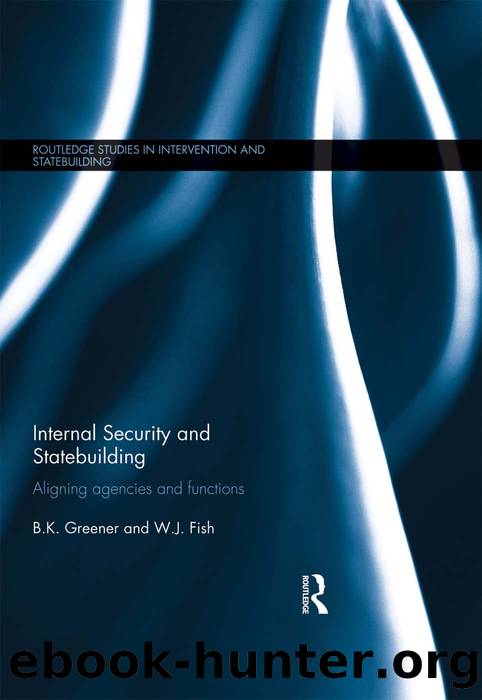Internal Security and Statebuilding: Aligning Agencies and Functions by B. K. Greener & W. J. Fish

Author:B. K. Greener & W. J. Fish [Greener, B. K. & Fish, W. J.]
Language: eng
Format: epub
Tags: Australia & New Zealand, Political Science, Political Freedom, History, Law Enforcement, Security (National & International)
ISBN: 9781317631330
Google: ZUqcBQAAQBAJ
Publisher: Routledge
Published: 2014-11-27T10:14:10+00:00
2000â2002: UNTAET
The UN Transitional Administrator Sergio Vieira de Mello was concerned that, as soon as security was restored, the local population would become impatient and would direct their frustration at UNTAET â creating long-term problems both for Timor-Leste and for the United Nations â and that therefore the Transitional Administration should be short in timeframe (Harland 2002: 4). With this aim in mind, in December 1999, UNTAET created a National Consultative Council made up of 11 Timorese and 4 international representatives to discuss policy issues and provide Timorese input into the work of the Transitional Administration. In July the following year, membership of the National Consultative Council was expanded to incorporate one representative from each of the 13 districts of Timor-Leste and was renamed the National Council. This Council became a legislative-style body, whilst a month later an executive body, the Transitional Council of East Timor, was created with four Timor-Leste representatives and four international representatives. It was this body that approved the creation of a new military institution in September 2000.
Prior to the Indonesian endorsement of the independence referendum, a number of prominent local political figures (such as Jose Ramos-Horta, Xanana Gusmão, and Taur Matan Ruak) had argued that an independent Timor-Leste should follow the example of Costa Rica and not develop a military. These attitudes were supported by an initial capability study carried out by Kingâs College London, which recommended that Timor-Lesteâs security needs could be fully met with only a police service and a border force, and that eschewing a national army would also help to demilitarise a traumatised society after years of resistance and armed violence (Kingâs College 2000). Yet some Timorese who had earlier argued against the need for a military were later to change their minds when they were in a position to influence decision-making processes. Ramos-Horta, for example, later contended that âthe challenges that this country faces internally and externally advise us to have a credible, significant, highly trained defence forceâ (Simonsen 2006: 586).
Although UNTAETâs mandate included clear directions to undertake security sector reform and capacity building within the policing sector, there was no clear mandate for creating or training a defence force (Armstrong et al. 2012: 5). For a variety of reasons, including pressure from some local elites, UNTAET made the decision one year into the mission to help create a new Defence Force â the Falintil-Forcas de Defesa de Timor-Leste or F-FDTL â trained primarily by Australia and Portugal (Goldstone 2013: 220). As the name suggests, recruits for the first Battalion of the F-FDTL were primarily drawn from Falintil members, and many of these were from the east of the country. The second Battalion was then comprised of younger recruits without experience of resisting the Indonesian occupation (Rees 2004: 31) in a concerted effort to balance the geographical and generational imbalances of the first Battalion (Goldstone 2013: 221). Despite its contentious beginnings, and concerns that some had been left out of the recruitment process, the F-FDTL enjoyed high levels of legitimacy due to its connection to the resistance movement.
Download
This site does not store any files on its server. We only index and link to content provided by other sites. Please contact the content providers to delete copyright contents if any and email us, we'll remove relevant links or contents immediately.
Killers of the Flower Moon by David Grann(3228)
Machine Learning at Scale with H2O by Gregory Keys | David Whiting(2269)
Will by Will Smith(2033)
Guns, Germs and Steel by Diamond Jared(1876)
Borders by unknow(1780)
The Room Where It Happened by John Bolton;(1717)
The Color of Law by Richard Rothstein(1574)
Once Upon a Broken Heart by Stephanie Garber(1472)
Water Rights and the Environment in the United States by John Burch(1414)
Examples & Explanations: Administrative Law by William F. Funk & Richard H. Seamon(1324)
Friends, Lovers, and the Big Terrible Thing by Matthew Perry(1324)
A Short History of War by Jeremy Black(1295)
Pharmacy Practice and The Law by Richard Abood(1252)
HBR's 10 Must Reads 2022 by Harvard Business Review(1251)
That Every Man Be Armed by Stephen P. Halbrook(1236)
The Strength In Our Scars by Bianca Sparacino(1234)
The Guarded Gate by Daniel Okrent(1219)
515945210 by Unknown(1205)
Injustices by Ian Millhiser(1197)
